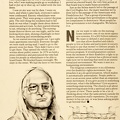SALT OF THE EARTH
People who are good & thirsty for justice
[Headline] Rev. Wade Blank
[Subheading] Michael Ervin interviews Rev. Wade Blank
Wade Blank is co-founder of the Atlantis Community for people with disabilities in Denver, Colorado. Working in a nursing home, Blank, an ordained Presbyterian minister, became out-raged by the way residents there were treated like children with no control over their lives. Since the early 1970s, he and the Atlantis Community have helped hundreds of clients move into independent, integrated housing throughout Denver.
Atlantis has also revitalized the disability-rights movement nationally by launching American Disabled for Accessible Public Transit (ADAPT). That organization has led campaigns of civil disobedience to force city transportation boards to ensure access for persons with disabilities to public transportation. The demands of ADAPT became federal law as part of the Americans with Disabilities Act of 1990.
"That a group of powerless people can change their government is the greatest compliment to democracy," says Blank. "It's what we learned in civics. Most people believe government is not changeable. We believe it is."
I grew up in Canton, Ohio. The joke around the house when I decided to go into the ministry was that the Vietnam War was God's way of calling me into the church. I was a classic WA$P conservative. I was going to be a country preacher But then at McCormick Theological Seminary in Chicago they gave me the intellectual education to critique my own ignorance about theology. Mix that with the black militant historians who were coming on the scene.
I went to Selma because I had a black friend in the seminary who dared me. I saw these blond women in miniskirts yelling "nigger-lover." It didn't fit my stereotype of blond women in mini-skirts.
I was feeling boxed in by life. Everybody was going to fight this war in Vietnam, and that was neat and tidy. Blacks had their place, and that was neat and tidy. I had the same feelings of in-adequacy everybody else did. Suddenly, there's someone saying, "Maybe you're not inadequate. Maybe the system makes you feel inadequate."
When we started Atlantis, I saw it as fitting in with all that. Dr. Martin Luther King said the joy of the struggle was in the struggle. This was the struggle. The mission of Jesus was to stir up the status quo and make people whole. That's what this movement is all about. It's about taking someone with cerebral palsy and saying, "You are a total person in society, and if people don't believe that, they're going to before we're done with them."
By 1966 I was ordained and had taken a rural parish in Ohio. I lasted about a year and a half before the lid blew. I opened a coffee house with a rock band. But the parents had their kids boycott it. So it fell flat.
The next call I took was in Akron at an all-white church. I got tight with the black clergy down the street. We would bring the black Baptist choir into our church and send our choir there.
Then the Kent State stuff started. I offered some alternative services, and SDS (Students for a Democratic Society) members started coming. We opened a storefront called Alice's Restaurant where we sold books and did draft counseling. We started running people into Canada. These were guys being drafted. Their numbers had come up. I would leave my Volkswagen full of gas and leave the key under the mat. If the car ever got caught, I would claim it was stolen.
One day when I got to my office, two guys were going through my desk. Turns out they were FBI. They called all the members of my church. After the shootings at Kent State I had 35 members left. So it closed.
I went back to the seminary and got my master's degree. Then my wife and I decided to drop out. We put names of cities in a hat and picked Denver. I got a job at $1.90 an hour as an orderly at a nursing home. After a year I quit. But the nursing-home owner hired me back as a recruiter. Can you imagine me coming to your house and selling you on living in a nursing home?
I had community meetings and saw some of the deep, deep places some people from state institutions were coming from. They weren't educated, they didn't have any self-esteem, they didn't know their parents. I put that into political jargon. I said, "The problem is you're stuck here. The problem is whether you have any rights as a person."
They began to grab onto that. Anything that went wrong, their rebuttal was, "I have rights." They challenged me on why I was enforcing curfew, why I was making people go to workshop. I had to put up or shut up, so I sided with the residents.
I was on my way out by then. I went on leave, and when I came back, everyone's radios were confiscated. Electric wheelchairs were taken away. They were going to control the peasants. The only thing the residents had to fall back on was what I taught them about demonstrations and activism. So they started refusing to eat, refusing to do anything. The nursing-home director drove out one night, and he was kicking doors open, shining a flashlight in their faces, insulting and intimidating people.
So we started moving people out. I got eight slum apartments renovated. Everyone thought we were stark raving mad. I used to go to the grocery store for them. They didn't have a way to get there. That opened the whole can of worms about public transit In 1978 we held a press conference and announced the time had come for people in wheelchairs to be able to board buses. We blocked buses overnight. We slept in the street. We had the keys to two buses and demanded the general manager come down and get the keys. We made him walk a gauntlet of wheelchairs. We announced we would hold protests once a month until all buses were accessible. During the process we proposed an elected transit board. When the state legislature approved an elected board, the very first action of that board was to make buses accessible.
Just as the Selma march led to the passage of the Civil Rights Act, the many marches we've done led to the passage of the Americans with Disabilities Act. That a group of powerless people can change their government is the greatest compliment to democracy. Most people believe government is not changeable. We believe it is.
Now we want to take on the nursing-home industry, one of our most oppres-sive systems. It's a $52 billion industry. We want to defund it and create serv-ices that allow disabled and elderly people to live at home and participate in society. We need to use that money to liberate people. It would be redirected into a national attendant-services program. It would guarantee a person from the moment of their disability a right to attendant services. If a person has a physical need, right now we're meeting that need in an institutionalized environment. We want it met in a humanizing environment.
The religious community is in a dilemma over the disability-rights movement. It approaches it as a do-good situation, which makes it automatically paternalistic. People prefer to see it as an access issue rather than an empowerment movement. If you give access to something irrelevant, what's the difference? Give access to something empowering. The church is all about empowering people from a spiritual and a physical point of view. There needs to be a lot of thinking about what the lame person outside the gates of Jerusalem really represents. Do you put money in his tin cup, or was Jesus asking people to go beyond that? ■
[image] drawing of Wade Blank next to three wheelchairs
- Oppretta
- Onsdag 24 Juli 2013
- Lagt inn
- Onsdag 9 Oktober 2019
- Visingar
- 188
- Rangering
- ingen rangering
- Ranger dette bilete


0 kommentarar